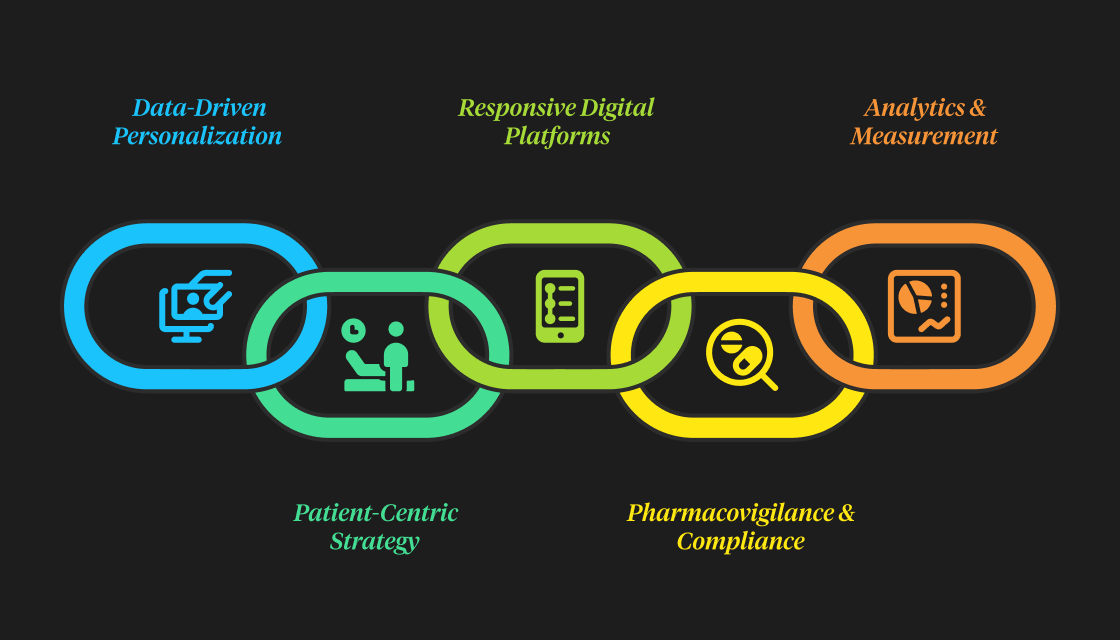by Kadambari Bendre
6 minutes
The Ultimate Guide To Omnichannel Pharma Marketing: Connecting Seamlessly With HCPs And Patients In 2025
Discover how omnichannel marketing is transforming pharma by enhancing customer engagement, personalization, and brand loyalty.

Approximately 7.21 billion people globally use smartphones, representing about 90% of the world's population. On average, individuals own 3.3 connected devices. This widespread device ownership highlights the importance of omnichannel marketing strategies, as consumers frequently switch between devices throughout the day. In such a fast-paced digital marketing world, it’s no surprise that organisations are stepping up their game to keep up, and that’s where omnichannel marketing comes in!
Well, Pharma Companies are no exception! As the industry works to adapt, the most important questions arise: Can pharmaceuticals fully harness the power of omnichannel marketing? What are the best strategies to make it work? The good news is that the answers are within reach!
Let’s dive in and explore how pharma can go for omnichannel marketing to stay ahead of the curve!
What Is Omnichannel Marketing In Pharma?
“Omni” means “all” or “universal,” so omnichannel marketing unites multiple channels to create a consistent and smooth experience. Omnichannel pharma marketing helps pharmaceutical companies connect with stakeholders smoothly across various platforms. This approach blends online tools like websites, mobile apps, email, and social media with traditional methods such as banners, billboards, and sales reps to reach customers effectively.

For example, a pharma company might offer online order placements and inquiries while running a physical store for consultations and purchases. The goal is to boost sales through a clear, unified brand message, and you know what, it actually works! “Think with Google” reports that effective omnichannel strategies can drive up to 80% of in-store visits. Plus, with 98% of Americans switching between devices daily, relying on just one channel is outdated. Omnichannel marketing isn’t just a trend; it’s the future of pharma marketing!
Check This Out: SEO In Pharma Marketing: How SEO Can Boost Online Visibility And Engagement In Pharma
Benefits Of Omnichannel Marketing In Pharma You Must Know!
The omnichannel marketing strategy comes with a lot of advantages! The best part about this approach is that everyone, from pharma companies to healthcare practitioners and patients, can benefit from this strategy. Moreover, the approach of personalisation in marketing helps build smooth and strong connections, resulting in more effective treatments and improved health outcomes.
a) Customer-Focused Services — Omnichannel marketing puts the spotlight on clear communication, ensuring medical products and information reach patients directly. This not only empowers patients but also builds their trust in the brand. Regarding pharma companies, it’s a smart way to create lasting relationships with their customers.
b) Maintains Brand Consistency — When people switch between different types of devices, conversations with the same organisation can feel inconsistent. Omnichannel marketing fixes this by creating a smooth, unified experience that helps reduce confusion and keeps everything organised.

c) Enhances Brand Engagement — Omnichannel marketing connects every step of the customer journey, making experiences seamless and boosting brand loyalty. It also provides valuable feedback, guides innovation, and ensures customer satisfaction.
d) Data-Driven Decision-Making — Better data analytics in omnichannel marketing allows for personalised experiences and more innovative strategies. It helps predict customer requirements, aligns services accordingly, and reduces risks by relying on insights instead of guesswork.
e) Optimized Utilization Of Resources — It's evident that having personalised customer data at your fingertips makes managing your marketing strategy much more straightforward. It helps direct resources where they matter most, leading to cost savings and boosting results. Plus, with automation and a broader reach, achieving the best ROI has never been easier.
How Can Omnichannel Pharma Marketing Help Build A Seamless Customer Experience?

The pharmaceutical industry is complex and highly structured, making omnichannel marketing a turning point for pharma sales. Utilising diverse marketing strategies helps create a seamless customer experience, builds loyalty, and supports improved patient outcomes.
1) Data-Driven Personalization
The foundation of omnichannel marketing is customer data. Marketers can understand customer habits and preferences by gathering and analysing this data. This insight lets them personalise content and interactions across different channels, creating a more seamless and practical experience.
2) Patient-Centric Strategy
The digital age has encouraged patients to take responsibility for their health. As a result, pharma companies are shifting their focus to patients rather than just healthcare providers. Omnichannel marketing supports this patient-centred approach, making it easier for companies to connect with patients directly and build stronger relationships to provide better care and information.

3) Responsive Digital Platforms
Technology and mobile innovation advancements have made it simpler to create responsive digital channels. From social media to websites, companies are using AI and bots to provide quick, smart replies. These tools engage customers and give healthcare professionals easy access to data anytime, anywhere.
4) Pharmacovigilance & Regulatory Compliance
In the pharmaceutical industry, integrity is crucial because it directly impacts human life. Strict regulations are in place to ensure safety and transparency. Therefore, omnichannel marketing helps pharma companies comply with these rules by ensuring all marketing materials include essential details like risks and side effects.
5) Analytics & Measurement
Data is the most crucial part of modern marketing, especially in omnichannel strategies. Marketers use analytics tools to track key performance indicators (KPIs), measure the success of their efforts, and adjust their approach for better results.
Also Read: Pharma Marketing: Push Marketing vs Pull Marketing Strategies for Pharma Companies!
A Few Real-World Examples Of How Pharmaceutical Companies Have Utilized Omnichannel Marketing Strategies!
A) Pfizer: Pfizer used an omnichannel approach to improve how it engaged with healthcare professionals during a new therapy launch. The company studied the communication preferences of doctors—some preferred emails, others liked webinars or face-to-face meetings. Based on this data, Pfizer created personalized content and delivered it through the channels each doctor used most. This helped them connect better with doctors, who received useful information in a comfortable format. As a result, more doctors engaged with the content, and the new therapy gained attention faster.
B) Novartis: Novartis created a patient-centered digital program to help people manage chronic diseases better. They introduced tools like a mobile app, regular SMS medication reminders, emails, virtual support from nurses, and social media content to educate patients. They also worked with doctors so that patients could access these tools during their regular visits. The information patients received was tailored based on their treatment stage and behavior. This approach led to more patients taking their medication as prescribed and using the support tools more regularly.
C) Sanofi: Focused on raising awareness about rare diseases like Pompe and Gaucher. They designed an omnichannel campaign that reached both doctors and patients. It included educational webinars, online articles, social media posts, email newsletters, and tools that helped doctors identify early signs of the diseases. All the information collected from these different channels helped Sanofi understand what messages worked best and where. As a result, more doctors began testing for these rare diseases, and many patients were diagnosed earlier than before.
D) GSK: Aimed to educate healthcare professionals about vaccines in different countries. They built a global digital platform that delivered personalized information to doctors through email, websites, and mobile devices. By studying past interactions and preferences, they made sure doctors only received relevant and helpful content. The platform also allowed local teams in each country to adjust the message to suit their region. This strategy helped GSK get better engagement from doctors and increased the use of vaccines in several areas.
E) Roche: Roche used an omnichannel strategy to raise awareness about its cancer treatments. They combined webinars, videos, emails, social media, and websites to reach doctors and patients. By tracking which content worked best, they personalized follow-ups, doctors received materials based on their interests, and patients accessed easy-to-understand videos and support tools. This helped improve engagement, build trust, and support better decision-making.
Wrapping It Up!
Today, pharma companies are adopting omnichannel marketing as an innovative, strategic approach to connect with their audiences. When combined with effective social media strategies, it drives growth and fosters organic engagement, keeping end-users informed, educated, and satisfied. However, embracing omnichannel marketing comes with many challenges, and one of the major roadblocks is the utilisation of inadequate integration software, which can create a fragmented experience.
But when done right, the possibilities are enormous! Omnichannel marketing in pharma stands out due to its focus on personalised communication and patient-centred care. It allows companies to nurture relationships with their audiences, providing tailored experiences that meet the unique needs of every customer.
So, Are you ready to take your pharma marketing to the next level? Start your journey today!
To stay updated with the next marketing trends, follow Pharma Now.
FAQs
1. Multichannel vs. Omnichannel: Which is Better
Multichannel is a step up from using just one channel, but omnichannel goes even further. It helps create a smooth customer experience and provides impressive business results, specifically in the pharmaceutical industry.
2. How Does Omnichannel Marketing Help Customers?
Instead of bombarding customers with the same message everywhere, online, in emails, by mail, or in-store, omnichannel creates a seamless journey. With this approach, customers can experience personalised, relevant content at every step of their journey, which makes their overall experience more engaging and fruitful.
3. Why Does The Pharma Industry Need To Implement Omnichannel Marketing?
Building trust and loyalty with healthcare professionals (HCPs) is extremely important in the pharma industry. Face-to-face meetings with reps have always been a key part of this, but as the world becomes more digital, HCPs now prefer more convenience, less hassle, and personalised communication. Omnichannel marketing meets these needs in the best way possible.




